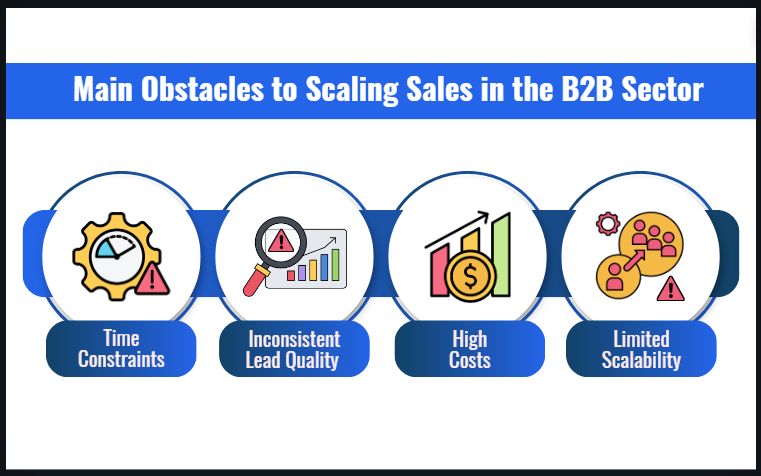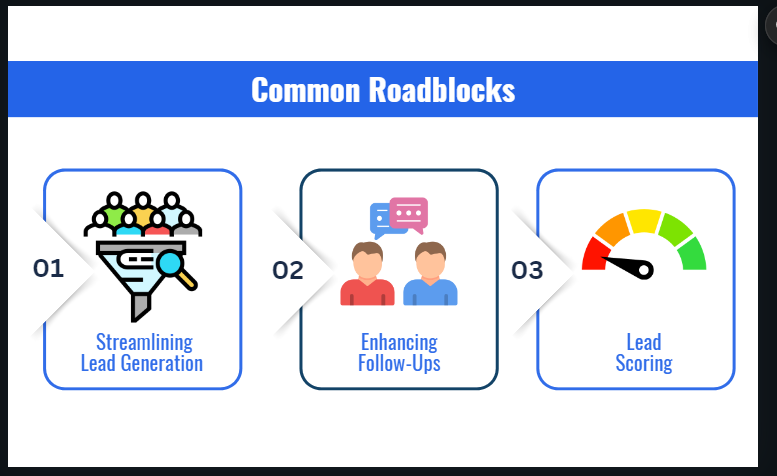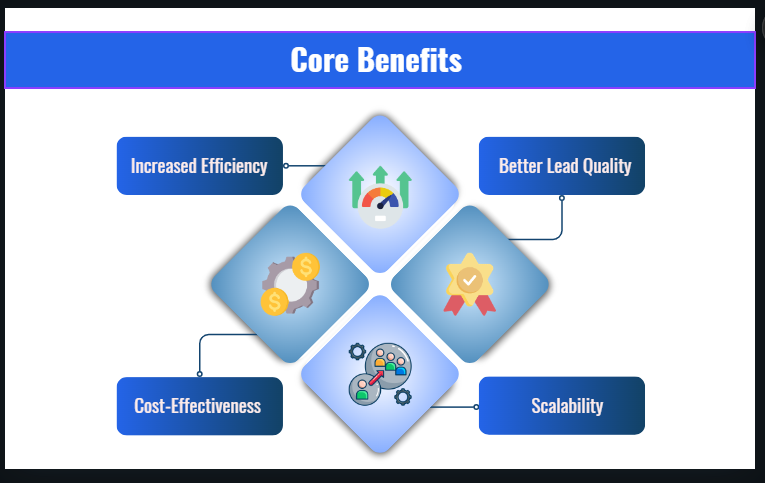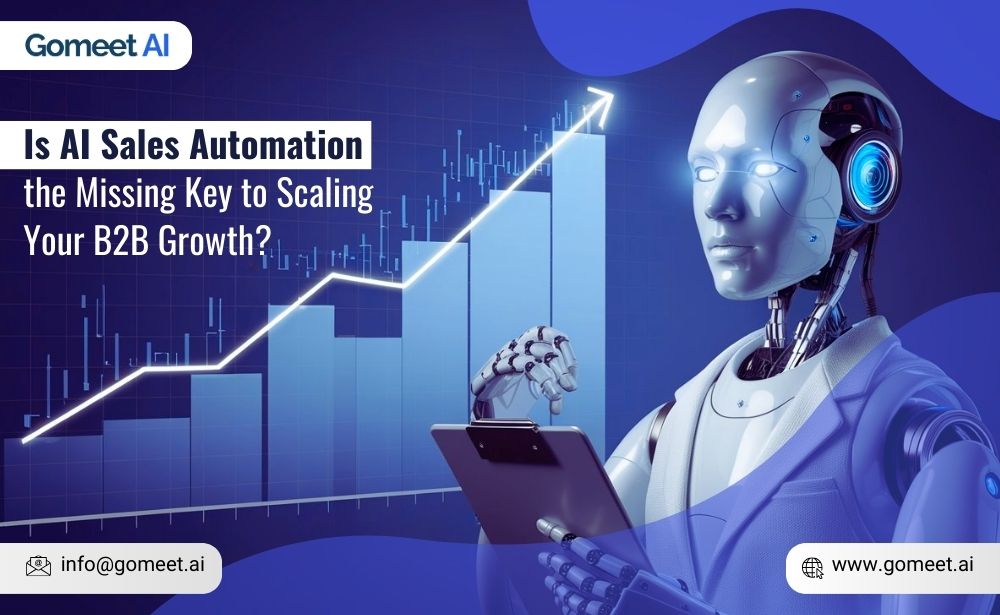Imagine this: Your B2B sales team is working tirelessly, juggling hundreds of leads, chasing prospects, and manually managing follow-ups. The result? Missed opportunities, inconsistent conversions, and your sales team stretched thin. Does this sound familiar?
In today’s hyper-competitive market, the ability to scale your sales operations can make or break your business. However, scaling using traditional methods is like trying to climb a mountain with no gear. You’ll get there—eventually—but at what cost?
This is where AI sales automation steps in. Companies embracing AI sales automation in the B2B space aren’t just staying afloat—they’re outpacing their competitors. According to a study by McKinsey, businesses that integrate AI into their sales processes see a 50% increase in leads and cost reductions of up to 40%. With AI driving your sales, you no longer have to rely on slow, manual processes to achieve growth.
Let’s explore why AI sales automation B2B is no longer an option but a necessity for scaling your business in a rapidly evolving marketplace.
1. AI Sales Automation B2B is Essential for Your Business Growth
Imagine this: You’re leading a B2B company, and your sales team is spending countless hours researching leads, writing emails, and keeping up with follow-ups. Are these tasks important? Absolutely. But are they efficient? Not at all.
Is your team spending too much time on repetitive admin work? Are they missing opportunities for meaningful interactions and closing deals? If you answered yes, then it’s time to consider AI sales automation.
Businesses that don’t adopt automation are not just missing out on time savings—they’re losing out on better lead generation, faster response times, and higher conversion rates. Gartner reports that by 2025, 75% of B2B sales organizations will be using AI to improve decision-making and scale faster.
So, can your business really afford to stick with outdated, manual processes? In a competitive landscape where response time and personalized outreach determine success, AI sales automation is the key to unlocking scalability and long-term growth.
2. What Are the Main Obstacles to Scaling Sales in the B2B Sector?
Scaling a B2B sales operation is challenging. While there’s always the potential for growth, several roadblocks often prevent businesses from expanding their sales efficiently:
- Time Constraints: Sales teams are often overwhelmed with tasks like manual lead generation, follow-ups, and data entry, which limit their ability to focus on high-priority leads.
- Inconsistent Lead Quality: Traditional methods often result in poor-quality leads or untimely follow-ups, which can negatively affect conversion rates.
- High Costs: Relying on manual processes for lead generation, outreach, and follow-ups means hiring more staff to handle increased sales volume, which escalates costs.
- Limited Scalability: B2B businesses struggle to scale when manual processes require more time and resources, limiting the number of prospects a team can engage with.
Without the proper tools in place, businesses risk stagnating. AI sales automation can help eliminate these bottlenecks, allowing teams to focus on strategic sales activities and scale effectively.

3. Common Roadblocks to Scaling Sales in B2B
- Streamlining Lead Generation
One of the most time-consuming tasks in sales is lead generation. AI sales automation identifies, qualifies, and nurtures leads in real-time. Instead of manually searching through data or depending on guesswork, AI algorithms comb through massive datasets to find prospects that fit your Ideal Customer Profile (ICP).
- Imagine cutting down the time spent generating leads by 70%. AI makes this a reality by automating tasks that would normally take weeks to complete.
- Enhancing Follow-Ups
AI sales automation platforms can send personalized follow-ups based on specific triggers such as email opens, website visits, or interactions. This level of personalization increases engagement and ensures no leads are lost due to delayed responses.
- AI-driven follow-ups mean that leads receive the right information at the right time—something that manual processes struggle to achieve.
- Lead Scoring
Lead scoring, another crucial part of the sales process, helps sales teams prioritize leads most likely to convert. AI analyzes historical data, purchase behavior, and real-time interactions to rank leads, so your team knows exactly where to focus their efforts.
- With AI sales automation, sales teams can work smarter, not harder, and target the highest-priority leads without wasting time.

4. What Are the Core Benefits of Using AI Sales Automation for B2B Scaling?
Increased Efficiency
By automating tasks such as lead qualification, follow-ups, and data entry, AI eliminates the need for sales reps to engage in repetitive tasks. This increased efficiency allows your team to focus on what they do best—closing deals.
Cost-Effectiveness
According to a study by McKinsey, companies that have adopted AI sales automation report up to 40% cost savings in administrative tasks. Instead of hiring additional sales staff to handle higher sales volumes, AI scales your outreach effortlessly, saving both time and money.
Better Lead Quality
AI uses predictive analytics to sift through leads and determine which ones are most likely to convert. This improved lead quality results in higher conversion rates, ensuring that your sales pipeline remains robust and active with qualified leads.
Scalability
One of the biggest advantages of AI sales automation in B2B is its scalability. While traditional methods often falter under increased workload, AI systems can handle thousands of prospects simultaneously, giving your business the edge it needs to grow.

5. Example of AI Sales Automation for Scaling B2B Businesses
Let’s consider the hypothetical case of ABC Tech, a mid-sized B2B company that adopted AI sales automation. Before implementation, ABC Tech’s sales reps spent over 60 hours each month manually qualifying leads, with only 20% converting into meaningful deals.
After integrating AI into their sales process, they saw significant improvements:
- Time Savings: Sales reps reduced time spent on lead qualification by 50%.
- Lead Conversion: Their lead-to-customer conversion rate increased by 30%.
- Cost Savings: ABC Tech saved over $100,000 annually by reducing the need for manual sales tasks.
By leveraging AI-driven insights, ABC Tech was able to scale without hiring additional staff, proving the power of AI in automating B2B sales.
6. Best Practices for Integrating AI Sales Automation in Your Business
- Choosing the Right Tools
Not all AI tools are created equal. When selecting an AI sales automation platform, look for features like CRM integration, predictive analytics, and real-time data processing to ensure that the tool works seamlessly with your existing systems.
- Seamless Integration
Ensure that your AI tool integrates smoothly with your CRM and marketing platforms. This will provide a unified view of your sales pipeline and eliminate data silos, making it easier to track performance.
- Measuring Success
To evaluate the success of your AI integration, track KPIs such as response times, conversion rates, and pipeline velocity. These metrics will help you fine-tune your automation efforts and maximize ROI.
7. What Does the Future of AI Sales Automation B2B Look Like?
AI sales automation is not just a trend; it’s the future. As AI becomes more advanced, we can expect to see innovations like hyper-personalization, virtual AI sales assistants, and predictive sales insights taking over. These tools will further streamline B2B sales, allowing businesses to provide a more personalized and efficient customer experience.
Conclusion
The key to successful scaling in B2B sales is automation. With AI, businesses can manage large volumes of leads, improve efficiency, and significantly reduce costs. If you want to future-proof your sales strategy and stay competitive, there’s no better time to integrate AI into your sales process.

